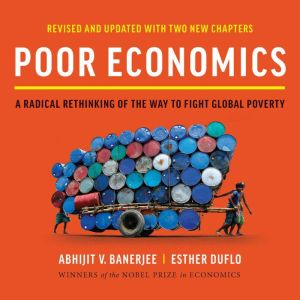Quotes
By the winners of the 2019 Nobel Prize in Economics
Winner of the Financial Times/Goldman Sachs Best Business Book of the Year
“Randomized trials are the hottest thing in the fight against poverty, and two excellent new books have just come out by leaders in the field. One is Poor Economics by Abhijit Banerjee and Esther Duflo. These terrific books move the debate to the crucial question: What kind of aid works best?”—New York Times
“Marvelous, rewarding... the sheer detail and warm sympathy on display reflects a true appreciation of the challenges their subjects face. They have fought to establish a beachhead of honesty and rigor about evidence, evaluation and complexity in an aid world that would prefer to stick to glossy brochures and celebrity photo‑ops. For this they deserve to be congratulated‑‑and to be read.”—Wall Street Journal
“The ingenuity of these experiments aside, it is the rich and humane portrayal of the lives of the very poor that most impresses. [The authors] show how those in poverty make sophisticated calculations in the grimmest of circumstances. . . . Books such as these offer a better path forward. They are surely an experiment worth pursuing.”—Financial Times
“To cut to the chase: this is the best book about the lives of the poor that I have read for a very, very long time. The research is wide ranging. Much of it is new. Above all, Banerjee and Duflo take the poorest billion people as they find them. There is no wishful thinking. The attitude is straightforward and honest, occasionally painfully so. And some of the conclusions are surprising, even disconcerting.”—Economist
“A compelling and important read... An honest and readable account about the poor that stands a chance of actually yielding results.”—Forbes.com
“Duflo and Banerjee tell these stories (of their randomised control trials) in a lovely new book called Poor Economics. As they admit, randomistas cannot answer some big questions‑‑how to tackle food prices, for instance. But through lots of microstudies, they make a subtle case for one big argument: aid really can help poor people, provided the money follows the evidence.”—Guardian
“In an engrossing new book [the authors] draw on some intrepid research and a store of personal anecdotes to illuminate the lives of the 865m people who, at the last count, live on less than $0.99 a day.”—Free Exchange (Economist)
“Fascinating and captivating. Their work reads like a version of Freakonomics for the poor. There are insights into fighting global poverty from the remarkable and vital perspective of those whom we profess to serve. They remind us, I think, of our shared humanity and how at some fundamental levels we really do think alike.”—Fast Company


![]()


